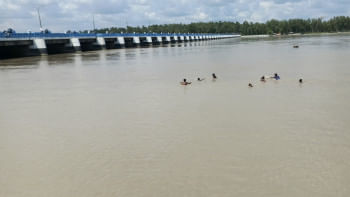'The Kerala Story': Absence of integrity in filmmaking

The screen lights up to a burkha–clad woman claiming that she is now Fatima, her previous identity being Shalini Unnikrishnan, indicating a case of forced conversion. Teary–eyed, she claims she had joined the ISIS and is now living in an Afghan jail. She further exclaims that she is not alone, there are 32,000 more girls like her.
What happens when a teaser like this is released, claiming it to be a true story, especially in a politically charged environment as this sub-continent? Produced by Vipul Shah and directed by Sudipto Sen, "The Kerala Story" has sparked massive debates and political engagements across India, as well as the sub–continent, over the content of the film.
The film claims that 32,000 girls from the South Indian state of Kerala have joined the Islamic State of Iraq and Syria (ISIS), and have presented their logic behind this claim. However, independent fact checking organizations have found that the political speeches that were cited as proofs were all either misquoted or exaggerated by the makers.
According to the United States Department of Country Reports, total number of Indian fighters in ISIS is 66. The Hindu reported in June 2021 that 4 Indian women live in Afghanistan with their husbands. These numbers are nowhere near the cited value of 32,000, which is in fact ludicrous when considered that ISIS overall has 40,000 foreign fighters.
Hindu fundamentalists, however, have been celebrating the movie despite the facts. They are using it as a justification for the allegations of Love Jihad against young Muslim men. This will further contribute to social segregation, where Muslim men are viewed as terror inciting and violent. The xenophobia that this movie percolates will also restrain the mobility of Hindu girls.
Kerala MP John Brittas has requested India's Union Home Minister Amit Shah to take "swift action" against the "mischievous" teaser of the film. Kerala's police have also protested, with its chief Anil Kant directing registration of a case on the complaint against the movie.
But people live in their own social bubbles, and choose to belief the truth that fits them. In the present atmosphere of rampant religious fundamentalism and xenophobia, is it not on the creators to create sensibly?
The sort of sinister plot to attract views at the cost of truth is unfortunately very common in India currently. Movies like "The Kashmir Files", which has presented false information and depicted the vulnerable Indian Muslim community in negative light, contribute to compromising history in popular imagination and public discourse as Bollywood has massive impacts on the society.
In an environment where communal violence and hatred have become common, we desperately need more sensibility and integrity from artists. Art must be free, but when it claims a fictionalized sinister story as truth, it is no longer limited within artistic freedom, rather becomes a case of smear campaign.

 For all latest news, follow The Daily Star's Google News channel.
For all latest news, follow The Daily Star's Google News channel. 





Comments